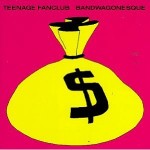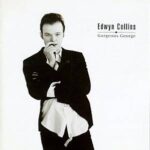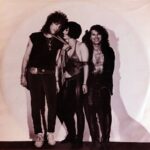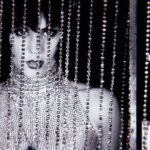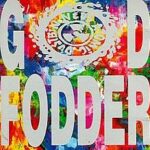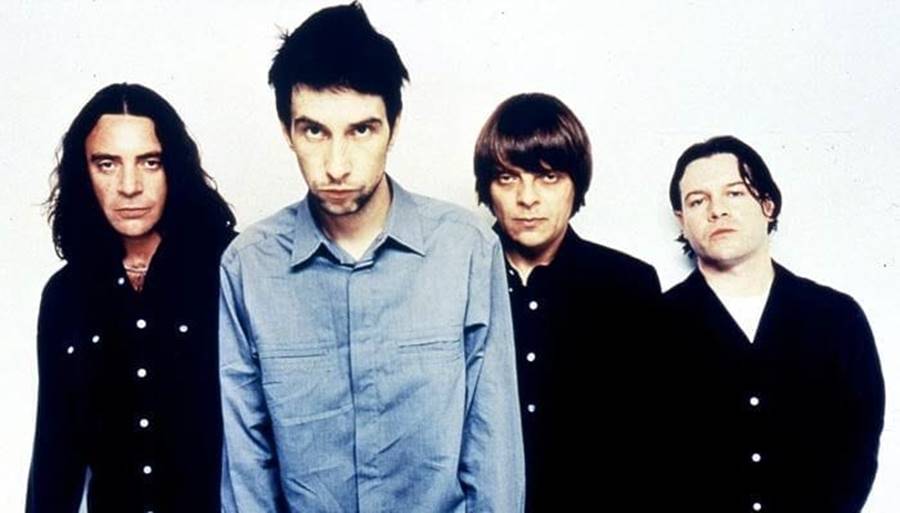
By Jae-Ha Kim
Chicago Sun-Times
February 21, 1992
“Our producer told us that anyone can get good guitar or drum sounds, but the vocals identify you as individuals,” says Raymond McGinley, guitarist-vocalist for Scotland’s latest darlings, Teenage Fanclub. “That’s one reason why we all sing, even though I’m not particularly comfortable doing it.”
In Britain, the punk-influenced pop band has been hyped by the normally acerbic music press as possessing “godlike genius” and being “leaders of the guitar renaissance.” These are heady words for any group to live up to, and the four charter members of Teenage Fanclub deal with the hullabaloo by ignoring it.
The group is an anomaly. It has a bubble-gum rock name that none of the four slightly grungy members live up (or down, depending on your point of view) to. After all the hype that surrounded its indie records, Fanclub chose to record its major label debut not in London, New York or Los Angeles, but in Liverpool. And the musicians’ record, “Bandwagonesque,” downplays their sonic guitar playing in favor of lead vocalist Norman Blake’s lush, wistful delivery, something that rarely happens in their concerts.
“This is our first tour of America, so I think people will be surprised at how loud we are live,” said McGinley, whose group will make its Chicago debut tonight at Cabaret Metro. “Everyone says it’s a good idea to record your album the way you sound in a gig, but I think that’s almost impossible to do. How is it possible to capture
everything that’s going on in a relatively sterile atmosphere? I don’t think it’s necessarily bad to not sound the same (on record as in concert). It’s just giving listeners two different views.”
McGinley, who has a degree in engineering, learned to play guitar at 17 – around the same time he was putting off preparing for college entrance exams. A self-taught musician who admires classically trained instrumentalists, he said one advantage of learning by ear is he began improvising and creating new music early
on.
“I think when you’re classically trained, you’re very concerned with technique and don’t bother writing your own material,” said McGinley, 28. “Art is valid whether it’s taught or learned by yourself, as long as you put personality into it. But I think what you lack in tech nique, especially in the beginning stages, you learn to make up for it other ways that hopefully help you develop as a musician.”
Laughing, he added, “At least that’s how I’ve chosen to look at it.”
Fellow Scotsman Bobby Gillespie has his own philosophy on life.
“I’d rather be Sid Vicious and dead than a Pet Shop Boy and alive,” he has said. The frontman for the British alternative dance group Primal Scream doesn’t particularly dislike the Pet Shop Boys on a personal level or even their droll pop songs, which he finds quite good. What he doesn’t like is the poker-faced seriousness that bands like the Boys project through their music.
“Music should be fun, whether it’s silly or serious,” said Gillespie who, with Primal Scream, will perform a “rave” style show as part of a six-hour event (complete with disc jockeys) tomorrow night at the Metro. “I think mostly everything out there is a waste of space, and I’m not just talking about what’s played on Top 40 radio. Frankly, I don’t think most of the so-called alternative bands are very good. For all the hype about the Pixies or R.E.M., they’re not that good. I think the new Michael Jackson stuff is better.”
Ironically, both Primal Scream and the Jesus and Mary Chain, the Goth-rock band he was in before he became a Screamer, are labeled alternative.
“Labels are a funny thing because they make record listeners feel a certain way before they even hear the music,” said Gillespie, 28. “I think when a term gets too hip (like alternative rock), a lot of bands that fall into that particular category get too comfortable. That’s not good for anyone, particularly the fans.”
